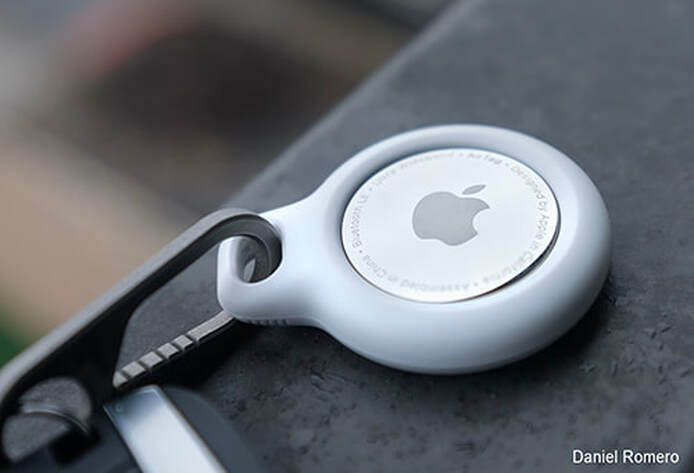author of Honorable Influence - founder of Mindful Marketing
So, if you’re wondering what to buy for that childhood friend-turned-felon this holiday season, Apple has the perfect present: AirTags--The gift that keeps on taking. This dark humor aims to underscore some disturbing news: More criminals are finding that AirTags are a convenient way to pilfer the valuable property of others or even worse, to stalk people.
Apple introduced the small electronic tracking devices this past April to help individuals more easily locate products they’re apt to misplace like keys and bags. The company’s website explains how the 1.26” diameter tags work:
“Your AirTag sends out a secure Bluetooth signal that can be detected by nearby devices in the Find My network. These devices send the location of your AirTag to iCloud — then you can go to the Find My app and see it on a map.”
Given that this location system leverages a vast network of strangers’ devices, Apple has made privacy a top priority. The company ensures that only the AirTag’s owner can see where their AirTag is, and its location data and history, which are always encrypted, “are never stored on the AirTag itself.”
These measures appear effective in protecting the property owner, i.e., the person who places the AirTag on their own phone, in their own bag, etc.; however, it seems that a major security risk remains, namely preventing those with ignoble intentions from attaching AirTags to the possessions of others.
Of course, most people would notice if an AirTag inexplicably appeared on their coat or keychain, but they’d probably never see one affixed to the underside of their automobile. Unfortunately, it didn’t take long for car thieves to realize AirTags’ wonderful potential for pilfering.
Various news media have reported the troubling trend in which thieves see sought-after vehicles in public places like mall parking lots, attach an AirTag to the car in an inconspicuous spot, and track the vehicle to a more private place, like the owner’s driveway, where it can be stolen more easily.
The notion of ‘auto theft made simple’ is disconcerting, but even more disturbing is the idea that criminals could use AirTags to stalk people. What if you’re in a public place and someone inconspicuously slides one into a bag you’re carrying? The wrongdoer could show up at your home anytime.
Fortunately, Apple claims there are measures to thwart such chilling contingencies; its website explains:
“AirTag is designed to discourage unwanted tracking. If someone else’s AirTag finds its way into your stuff, your iPhone will notice it’s traveling with you and send you an alert. After a while, if you still haven’t found it, the AirTag will start playing a sound to let you know it’s there. Of course, if you happen to be with a friend who has an AirTag, or on a train with a whole bunch of people with AirTag, don’t worry. These alerts are triggered only when an AirTag is separated from its owner.”
These precautions do help ally some concerns; yet, a few questions remain, for example:
- What if the person who’s unknowingly been ‘tagged’ doesn’t own an iPhone or have it with them, in which case they wouldn’t receive the alert?
- How long does it take for the alert to be triggered?
- How far does an AirTag need to be from its owner in order for the alert to be sent?
In keeping with the last question, if a person has an AirTag in a key chain that she hangs in a first-floor entryway, she won’t want an alert to sound each time she takes her iPhone to her second-floor bedroom. All this to say, AirTags’ security features give some significant reasons for pause.
Geoffrey Fowler, a columnist for the Washington Post, substantiated such concerns when he asked a colleague to pretend to stalk him for a week “from across San Francisco Bay.” He found that it took three days for the alert to sound, which amounted to “just 15 seconds of light chirping.” What’s more, if he didn’t own an iPhone, he wouldn’t have received any notification.
Although Fowler credits Apple for trying to do more to keep people safe than other tracking device makers, like Tile, have done, his experience still leads him to conclude that AirTags are “a new means of inexpensive, effective stalking.”
So, should Apple stop selling AirTags? Based on Fowler’s experiment, a natural conclusion is ‘yes.’ However, as it is with so many products that offer both positive and negative outcomes, the answer is not that easy.
For instance, many of us travel in automobiles each day to go to work, school, shopping etc. Tragically, more than 38,000 U.S. residents die in car crashes each year, and many more are injured. Also, we’ve unfortunately seen some use cars maliciously to kill others.
However, such incidents don't make many of us think twice about climbing into a car or crossing streets where others are driving them. Although the potential negative outcomes of injury and death are daunting, the great individual and collective benefits of car use overshadow those remote probabilities.
Similar rationale can be applied to many other products from kitchen knives to prescription drugs. We welcome their use because in the vast majority of cases they help people, not harm them.
Still, it’s fair to ask if AirTags offer a high enough risk-to-reward ratio. Yes, misplacing one’s car keys is annoying and can even be very frustrating, but we usually find them. How do we weigh the convenience of finding lost keys against the use of the devices to track others’ property or people themselves?
Those risks, especially if they become more common, likely don’t outweigh the rewards of quicker key recovery. However, there are several other, potentially more critical functions that AirTags can serve. Writing for Gadget Hacks, Jake Peterson identifies several of those uses, which include:
- Lifesaver Beacons: People with severe allergic reactions can place AirTags on life-saving medications like EpiPens.
- Location Trackers for Children: Parents can put the devices in their children’s backpacks or pockets and hopefully avoid experiencing their worst nightmare—a lost child.
- Location Trackers for People with Dementia: At the other end of the age spectrum, some individuals beset by mental decline wander off. AirTags can make it easier to find them quickly.
- Beacons for the Visually Impaired: The Find My app can help people with limited or no sight precisely locate important objects within their homes.
- Location Trackers for Pets: An AirTag can help ensure that a beloved animal is found, without needing to insert a microchip into the pet.
Do the benefits of these latter applications outweigh the risks of unscrupulous AirTag use? They probably do, provided that Apple continues to improve AirTag security and that the deviant behavior remains isolated. Assuming those two ‘tag rules,’ AirTags can be useful for many people, helping to make the tracking devices “Mindful Marketing.”
Learn more about the Mindful Matrix.
Check out Mindful Marketing Ads and Vote your Mind!




 RSS Feed
RSS Feed